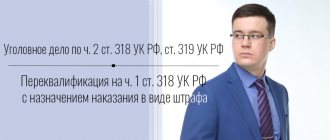A resolution to initiate a criminal case is a procedural document adopted based on the results of a preliminary inquiry in the event that the investigative body sees the elements of a criminal offense in the act under investigation, as stated in Article 140 of the Code of Criminal Procedure of the Russian Federation. Files in .DOC: Form of resolution to initiate a criminal caseSample resolution to initiate a criminal case
Concept of a criminal case
Criminal case.
This phrase is found quite often not only in the text of the Criminal and Criminal Procedure Codes of the Russian Federation. It is widespread among persons who have committed a crime, and, conversely, persons authorized by the state to suppress, investigate and disclose them - law enforcement officers, investigators, prosecutors and judges. It is often used by teachers and students of law universities, and often by ordinary citizens, especially those affected by crime. However, criminal and criminal procedural laws, as well as numerous textbooks on criminal law and criminal procedure, which use such a phrase as criminal case, do not disclose its concept. Therefore, in order to understand what a criminal case actually is, let’s turn to dictionaries.
Thus, the Legal Dictionary, posted on the Internet resource “Collection of dictionaries on VseSlova.ru”, gives the following definition: “A criminal case is a case initiated in accordance with the procedure established by law in each case of detection of signs of a crime”[1].
To make it even more clear, let us turn to the Explanatory Dictionary of the Russian Language, compiled by S.I. Ozhegov and N.Yu. Shvedova. [2] On page 159 of the said publication, one of the meanings of the word “case” is defined as “a collection of documents relating to a fact or person.”
Additionally, taking as a basis the interpretation of the word “criminal” as “relating to crime, to crimes and their punishability” (p. 824), and combining the meanings of these words together, we get the following definition: “A criminal case is a collection of documents related to a crime "
The documents collected in a criminal case are called procedural documents and evidence. In future publications, the issue of procedural documents and evidence will be discussed in more detail. For now, we note that the collection of these documents occurs during the preliminary investigation or inquiry in a criminal case by persons authorized by the Criminal Procedure Code of the Russian Federation (investigator or inquiry officer).
Initiating a criminal case against a specific person
Lawyer Antonov A.P.
When a criminal case is initiated against a person, that person must be known. The Code of Criminal Procedure of the Russian Federation provides for a special procedure for initiating criminal cases against a certain category of persons. Only in connection with the presence in the Code of Criminal Procedure of the Russian Federation of such special rules for initiating a criminal case, it is impossible to recognize as true the statement from which it follows that it is possible to initiate a criminal case against a person whose identity has not been established.
Indeed, sometimes the resolution states that the act was committed by a person not identified by the preliminary investigation body. In this case (in the absence of at least one of the other three, provided for in paragraphs 2 - 4 of part 1 of Article 46 of the Code of Criminal Procedure of the Russian Federation, there are no legal grounds for the appearance of a suspect in criminal proceedings), the suspect, as a subject of this particular criminal procedural proceeding, is not at all exists. The suspect cannot be unknown. And in this case, the phrase in the decision to initiate a criminal case that the person who committed the crime has not been identified means that the suspect (the person against whom the criminal case has been initiated) referred to in paragraph 1 of Part 1 of Art. . 46 of the Code of Criminal Procedure of the Russian Federation, is absent in criminal proceedings.
It is impossible to exclude a situation where a law enforcement officer, initiating a criminal case for an obvious crime, does not indicate in the resolution the person who committed a socially dangerous act. The Code of Criminal Procedure of the Russian Federation does not require that the person who committed the crime be included in the decision to initiate a criminal case. Although it should be recognized that some scientists, even under the existing criminal procedural legislation, consider it possible to state “that the body of inquiry, the inquirer, the investigator... if there is certain information about the person who committed it in the primary materials about the commission of a crime (report, verification materials), indicate this person in the decision to initiate a criminal case.” Others believe that failure to recognize such a person as a suspect “must, of course, be regarded as a violation of the right to defense.”
This point of view has the right to exist, but it remains only the scientific opinion of the scientist who expressed it. Based on the current legislation in the case under consideration (in the absence of at least one of the other three legal facts provided for in paragraphs 2 - 4 of part 1 of Article 46 of the Code of Criminal Procedure of the Russian Federation) in the criminal process there will be no person with the procedural status of a suspect.
There is another judgment that has the right to exist, that this clause 1, part 1, art. 46 of the Code of Criminal Procedure of the Russian Federation (as, indeed, a number of other articles, for example, part 4 of Article 146 of the Code of Criminal Procedure of the Russian Federation) unjustifiably discriminates against the legal status of such a subject of criminal proceedings as a person against whom the issue of initiating a criminal case is being decided. When an obvious crime is committed, criminal prosecution is carried out regardless of whether the last name, first name and patronymic of the person in question are indicated in the relevant resolution or not.
If we take this position, then the legislator should be asked to grant the status of a suspect not to the person against whom a criminal case has been initiated on the grounds and in the manner established by Chapter 20 of the Code of Criminal Procedure of the Russian Federation, but to the person against whom the issue of initiating a criminal case is being decided. And he is granted this right regardless of whether the investigator (inquirer, etc.) reflected the last name, first name and patronymic of the person subject to criminal prosecution in the decision he made to initiate a criminal case or not.
This is just a proposal for now. Therefore, at present it can only be of scientific interest. From a practical point of view, if in the decision to initiate a criminal case the person who committed a socially dangerous act is not indicated, then (in the absence of at least one of the other three provided for in paragraphs 2 - 4 of part 1 of article 46 of the Code of Criminal Procedure of the Russian Federation legal facts) it will not be a suspect. In this regard, it is important to find out when the investigator (inquiry officer, etc.) is obliged to indicate in the resolution the person who committed a socially dangerous act, and thereby provide the latter with a legal opportunity to take advantage of the legal status of the suspect?
Answering the question posed, we cannot but agree with Kalinovsky K.B. in part that “the name of the suspect must be indicated in the decision to initiate a criminal case even when he is presumably identified, i.e. there is evidence of his participation in the commission of a crime.” However, the scientist does not structure the circumstances of the subject of proof inherent in the stage of the criminal process under consideration. And these actions could have significant practical significance.
In order to initiate a criminal case against a specific person, the investigator (inquiry officer, etc.) must have information about at least three circumstances:
- that there was an act containing signs of the objective side of the crime;
- that a specific person took part in its commission;
- last name, first name and patronymic of the person.
Only the first of these circumstances should be precisely established. The second and third circumstances can be established tentatively. It will not be a violation of the law to initiate a criminal case against a person who identified himself (submitted false documents) by a name other than his own. It also cannot be considered illegal to initiate a criminal case against a person when the reason and (or) material of the inspection contained information about his participation in the commission of this crime, but then this information was refuted by evidence collected during the preliminary investigation.
If a criminal case has been initiated against a person, and the act of which he was suspected of committing does not have any criminally procedurally significant signs of the objective side of the crime, the initiation of a criminal case (and therefore granting the person the status of a suspect) should be declared illegal.
Sincerely, lawyer Anatoly Antonov, managing partner of the law firm Antonov and Partners.
Still have questions for your lawyer?
Ask them right now here, or call us by phone in Moscow +7 (499) 288-34-32 or in Samara +7 (846) 212-99-71 (24 hours a day), or come to our office for a consultation (by pre-registration)!
Reasons for initiating a criminal case
The reasons for initiating a criminal case are the sources established by the criminal procedure law, from which the competent authorities and officials receive information about the crime [3]. They play the role of a legal fact, entailing the beginning of the activities of the competent authorities to initiate a criminal case. [4]
An exhaustive list of reasons for initiating a criminal case is contained in Article 140 of the Code of Criminal Procedure of the Russian Federation. These include:
And if the information posted on our website was useful to you, please share it on social networks.
Stages of investigation
The primary element of the investigation (Article 144 of the Code of Criminal Procedure of the Russian Federation) is a preliminary inquiry, for which the investigative body is allotted from 3 to 10 days. If additional measures are required to determine the presence of a crime, the period may be extended to 30 days.
Such activities may include, among others, conducting examinations. For example, when a corpse is discovered, it is impossible to establish the cause of death without the special knowledge of forensic experts.
In order to find out whether the death was of a violent nature, an examination is ordered. Based on the results of the examination, an appropriate decision is made - either to initiate a criminal case or to refuse to initiate a criminal case (Article 145 of the Code of Criminal Procedure of the Russian Federation).
The second stage of the investigation is the initiation of a criminal case. As a rule, a criminal case is initially initiated based on the fact of the crime, that is, without involving the accused. At this stage, the person who committed the crime is usually either not identified or is a suspect rather than an accused.
Sometimes the initiation of a criminal case can be carried out simultaneously with the third stage, that is, with the issuance of a resolution to charge a person as an accused. This usually occurs if a person surrenders or if a person is detained at the scene of a crime in circumstances that directly indicate his involvement in a criminal act.
That is, the decision to initiate a criminal case is actually the beginning of a real investigation, during which the investigative authorities carry out the entire range of investigative actions from the stage of inquiry to the stage of sending the case to court.
The fourth stage will be the adoption of a decision to bring charges, followed by:
- bringing charges;
- drawing up an indictment;
- approval of the indictment;
- familiarization of the accused with the case materials;
- referral of the case to the court.
At all stages, starting with the initiation of a criminal case, the participation of a lawyer is mandatory.
Grounds for refusal
Upon receiving a report of a crime being committed or preparation for it, officials must conduct an investigation to determine the presence or absence of grounds for initiation. If there are no grounds, then a decision must be made to refuse initiation. The grounds for refusal are listed in Article 24 of the Code of Criminal Procedure. They are:
- there is no fact of committing a crime;
- there is no corpus delicti;
- the statute of limitations has expired;
- the accused or suspect has died. The exception is cases when rehabilitation of the deceased is required;
- There is no statement from the victim.
When the case ends, the persecution ends. A copy of the refusal to initiate proceedings must be sent to the prosecutor and the applicant no later than 24 hours. In accordance with Russian legislation, the applicant has the right to appeal the refusal in various instances. The complaint can be submitted to the leadership of the investigative body, the prosecutor or the judge. This possibility is regulated by Articles 125 and 124 of the Code of Criminal Procedure of the Russian Federation.
When a decision is made
After checking the accuracy of all the events described in the application, a month later, if this is an exceptional case, or after 3 days have passed from the date of the incident or filing of the application, the investigator makes a decision:
- Institute proceedings;
- refuse the procedure due to the lack of corpus delicti;
- transfer documents for maintenance to the authorities in accordance with the jurisdiction.
Transfer of cases is possible if the crime occurred in another area or minor harm to health was caused, the proceedings will be within the framework of a private prosecution.
The applicant receives a notification informing him that a criminal case has been initiated and preliminary investigative and investigative actions have begun.
Suspects appear based on the initiation of criminal cases. Previously, the law did not allow us to define and designate such a status.
Who doesn't have this right?
There are groups of persons who take part in the proceedings of a criminal case, but do not have the right to perform actions aimed at initiating it. Here you can specify persons such as:
- duty officers who receive complaints from victims;
- detectives carrying out direct investigative activities;
- private prosecutors and lawyers of the injured person;
- judges who do not have such powers.
Thus, it can be noted that the law establishes a strictly regulated range of persons who have the right to initiate legal proceedings if there are specific grounds.
Main conclusions
- A document requesting to initiate a criminal case must be drawn up only if the applicant is absolutely sure of the guilt of a certain individual;
- The structure of the document is standard - “header”, main part and details;
- The applicant must indicate that he is aware of giving false testimony on the basis of Article 306 of the Criminal Code of the Russian Federation;
- The text of the document indicates the circumstances under which the violation of criminal norms was committed, the place where it occurred, as well as the time;
- The applicant must have evidence confirming that the text he wrote is not unfounded.
What is not considered a reason or reason
Opening a criminal case is the initial independent stage of the process of investigating an offense. It must be carried out in accordance with the law in order to guarantee the validity of the decision made .
If a case is filed or not filed without justification, this means a violation of the law and harm to the interests of citizens, society and the country.
Cannot act as reasons:
- Anonymous statements. However, when the letter contains specific information about the place and time of the incident, it is sent to specialized services for investigation.
- Applications signed by a non-existent name.
- A statement made orally, not recorded in the protocol.
Procedural issues
The initiation of a criminal case necessarily goes through the third stage; the concept and meaning is associated with the need to monitor the legality of the activities of the law enforcement system. This work is performed by the prosecutor's office as part of its supervisory function. The relationship method is as follows:
- The corresponding decision is transmitted to three procedural persons: the prosecutor, the author of the application and the suspect immediately.
- The prosecutor's office checks the data contained in the document to identify procedural and legislative violations. In particular, the availability of the following data is checked: date, time and place of the issuance, reason and grounds, legal qualifications.
At the start of criminal proceedings, prosecutors are given 24 hours to study the text and the motivating part of the refusal. If violations are detected, this law enforcement body has the right to cancel the decision to initiate criminal prosecution (Article 37 of the Code of Criminal Procedure). In addition, the prosecutor may request materials from the initial inspection, if required to make an appropriate decision.
Some criminal cases are dealt with privately. This involves direct appeal to the magistrate. Private prosecution is brought for offenses that do not have qualifying characteristics. An example of such is light beatings, insults, etc. (Article 20 of the Code of Criminal Procedure). Moreover, criminal prosecution, the basis for which was a private accusation, is subject to termination in the event of reconciliation of the parties.
Verification of the circumstances described in the application may lead to abandonment of the criminal procedure. Such a decision is made on the following grounds (Article 24 of the Code of Criminal Procedure):
- the data specified in the application did not take place in reality;
- the act does not fall within the description of the crime;
- the statute of limitations for this type of violation of the law has expired;
- the suspect has died (there are exceptions);
- the victim refused to file a statement (if required by law);
- the competent authority refused to give consent to prosecute a person with official immunity.
Procedural refusal to initiate criminal prosecution has the following consequences:
- is stated by a resolution containing a motivating part (explanation);
- leads to consideration of the issue of initiating prosecution for a false denunciation;
- requires publication of information in the media in respect of which the application was submitted;
- sending a copy of the document to the prosecutor's office within 24 hours.
The legislation requires inquiry and investigation workers to carry out explanatory work with suspects and other participants in the process. They are informed of their legal rights and obligations against their signature.
Notification
Procedural decisions taken and the results of verification actions are immediately communicated to the applicant upon their completion. 3 days after receiving a report of a crime committed or 10 days if it was a motivated petition.
Within a month, cases are initiated, when operational search activities and documentary checks are carried out. As a result, a resolution is sent to the victim and the perpetrator of the unlawful act. Other interested parties are not required by law to report the outcome of the case.
Judicial and investigative practice shows that no one waits for 3 days to expire if the investigator finds clear, undeniable signs of illegal actions. The initiation of cases occurs without delay. The victims are also immediately informed that a case has been opened and a full investigation has begun.






